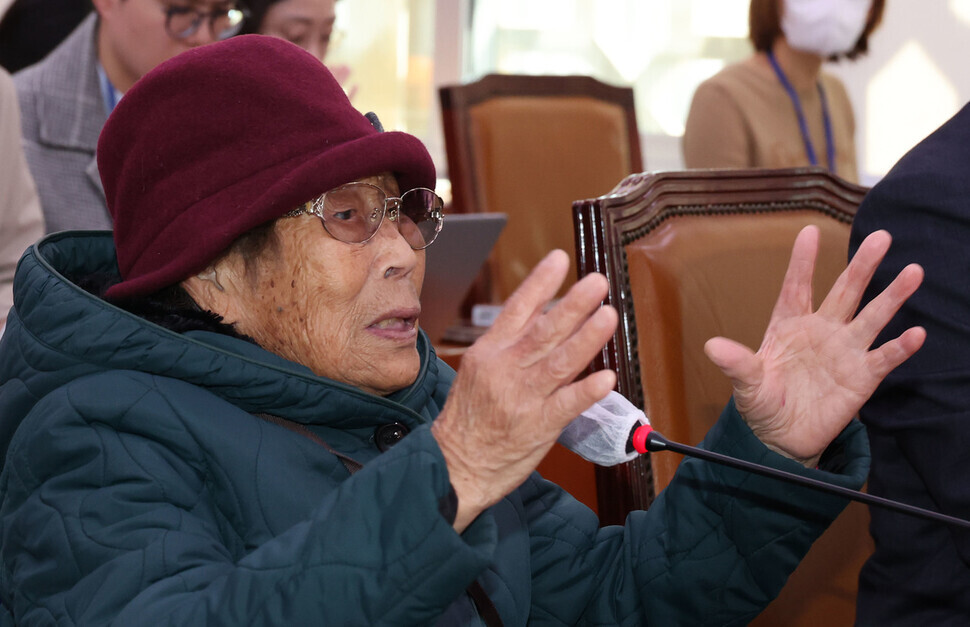hankyoreh
Links to other country sites 다른 나라 사이트 링크
3 nonagenarian forced labor victims officially reject Seoul’s third-party compensation plan

All three surviving forced labor mobilization victims who received a South Korean Supreme Court ruling confirming their right to claim damages formally announced Monday that they do not intend to accept Seoul’s plans for the payment to be made by a third party.
With no change in Tokyo’s stance on the issue ahead of a planned South Korea-Japan summit on Thursday, the issue has sparked a growing outcry among South Koreans.
On Monday, legal representatives of the three survivors — 94-year-old Yang Geum-deok and 95-year-old Kim Seong-ju and 99-year-old Kim Chun-sik — and groups working on their behalf submitted a document to the Foundation for Victims of Forced Mobilization by Imperial Japan stating their rejection of the government’s plan for third-party compensation.
On March 6, the South Korean government announced a “final resolution” for compensating survivors of forced labor mobilization during the Japanese occupation, in which payment would be provided by a third party without the participation of Japanese companies implicated in war crimes.
Under this approach, payment would be paid on those companies’ behalf by a foundation affiliated with the Ministry of the Interior and Safety (MOIS) to victims who were awarded compensation by a final Supreme Court ruling.
But the opinion submitted to the foundation Monday by the attorneys and victim rights’ groups stressed that a third party cannot discharge liabilities without the victims’ consent. Article 469-1 of the Civil Act states that “the performance of an obligation may also be effected by a third person,” provided that the parties have not “declared a contrary intention.”
The attorneys and groups are requesting that compensation not be allowed to take place against the parties’ will.
Appearing as a witness the same day at a plenary session of the National Assembly Foreign Affairs and Unification Committee convened by the Democratic Party, Yang Geum-deok voiced her objections to the government’s plan for resolving the issue, saying said she would “rather starve to death than accept the money that way.”
She also criticized President Yoon Suk-yeol, saying she wanted to “tell him to step down.”
Democratic Party members on the committee approved a resolution denouncing the government’s plan and calling for an apology and compensation from Japan. Designating this week as a period for “focused action” to criticize Seoul’s diplomatic approach with Tokyo, the party made plans to join civic groups Saturday in a rally in front of Seoul City Hall.
Lee Guk-eon, who serves as chairperson of the Citizens Association on Imperial Japan’s Forced Mobilization, appeared the same day at an emergency debate on the government’s resolution plan at the National Assembly Members’ Hall. There, he showed an amended version of an agreement drafted by Mitsubishi Heavy Industries in December 2011 after forced labor survivors filed suit in Japanese court.
In that document, the company expressed “sincere remorse” to the victims, although the agreement ended up breaking down over the omission of references to “forced mobilization” or “forced transportation.”
The message Lee sent was that the Yoon administration’s “solution” for resolving the dispute without any expression of remorse from the Japanese government or companies represented a step backward even from the plan Mitsubishi Heavy Industries put forward 12 years ago.
“They’re laying the dinner table with the same spoiled vegetables that were cleared off it a decade ago,” he said.
Lee added that the administration “is claiming that an apology from Japan is ‘asking the impossible,’ but that amounts to an admission of their own incompetence.”
In a debate held at the Korea Press Center in central Seoul’s Jung District by the Korean Association of Contemporary Japanese Studies, attendees offered their support for the government’s plan.
“The matter of improving South Korea-Japan relations was left unaddressed during the Moon Jae-in administration, and the time has come to fix that,” said Jin Chang-soo, director of the Sejong Institute’s Center for Japan Studies.
By Shin Hyeong-cheol, staff reporter; Jang Ye-ji, staff reporter; Um Ji-won, staff reporter
Please direct questions or comments to [english@hani.co.kr]

Editorial・opinion
![[Column] Life on our Trisolaris [Column] Life on our Trisolaris](https://flexible.img.hani.co.kr/flexible/normal/500/300/imgdb/original/2024/0505/4817148682278544.jpg) [Column] Life on our Trisolaris
[Column] Life on our Trisolaris![[Editorial] Penalties for airing allegations against Korea’s first lady endanger free press [Editorial] Penalties for airing allegations against Korea’s first lady endanger free press](https://flexible.img.hani.co.kr/flexible/normal/500/300/imgdb/original/2024/0502/1817146398095106.jpg) [Editorial] Penalties for airing allegations against Korea’s first lady endanger free press
[Editorial] Penalties for airing allegations against Korea’s first lady endanger free press- [Editorial] Yoon must halt procurement of SM-3 interceptor missiles
- [Guest essay] Maybe Korea’s rapid population decline is an opportunity, not a crisis
- [Column] Can Yoon steer diplomacy with Russia, China back on track?
- [Column] Season 2 of special prosecutor probe may be coming to Korea soon
- [Column] Park Geun-hye déjà vu in Yoon Suk-yeol
- [Editorial] New weight of N. Korea’s nuclear threats makes dialogue all the more urgent
- [Guest essay] The real reason Korea’s new right wants to dub Rhee a founding father
- [Column] ‘Choson’: Is it time we start referring to N. Korea in its own terms?
Most viewed articles
- 1New sex-ed guidelines forbid teaching about homosexuality
- 2OECD upgrades Korea’s growth forecast from 2.2% to 2.6%
- 3[Column] Life on our Trisolaris
- 4Months and months of overdue wages are pushing migrant workers in Korea into debt
- 560% of young Koreans see no need to have kids after marriage
- 6Presidential office warns of veto in response to opposition passing special counsel probe act
- 7Korean government’s compromise plan for medical reform swiftly rejected by doctors
- 8[Guest essay] Maybe Korea’s rapid population decline is an opportunity, not a crisis
- 9Is Japan about to snatch control of Line messenger from Korea’s Naver?
- 10Inside the law for a special counsel probe over a Korean Marine’s death